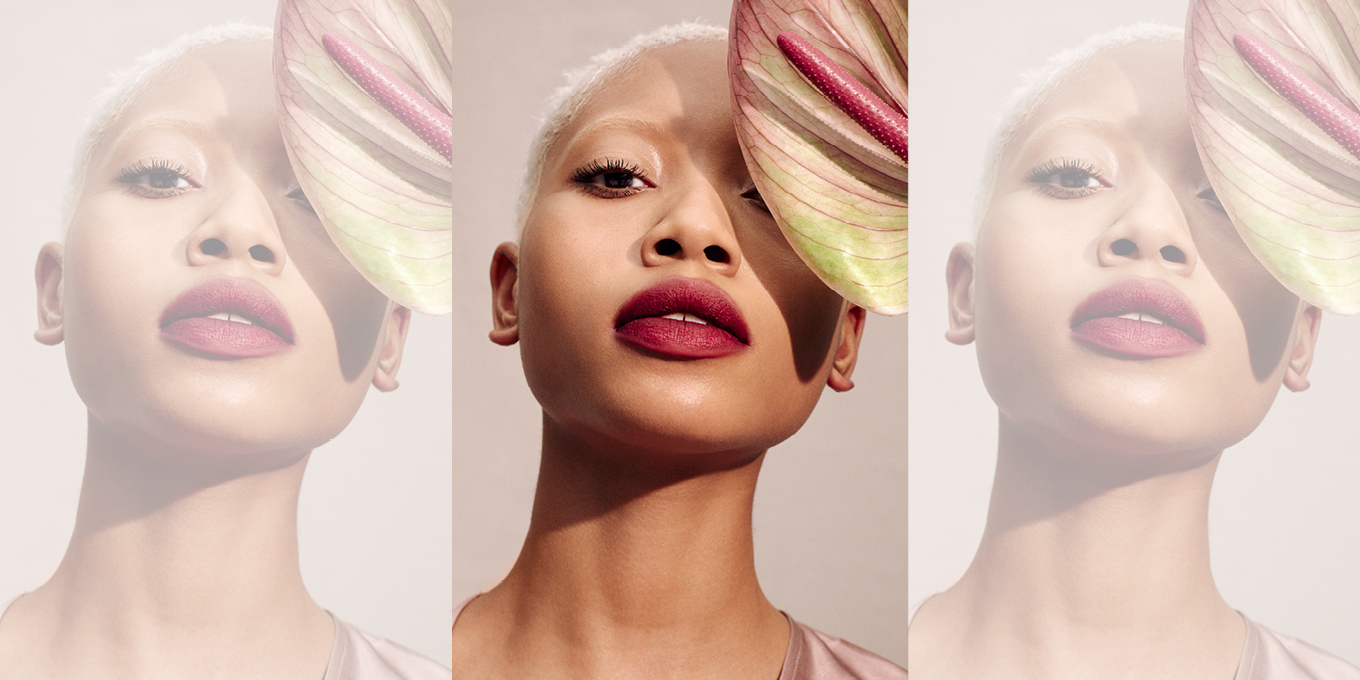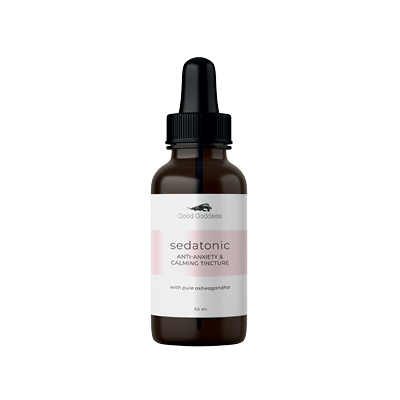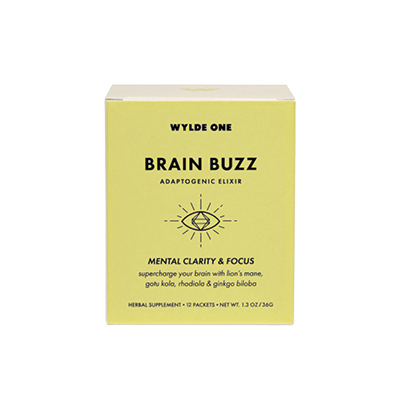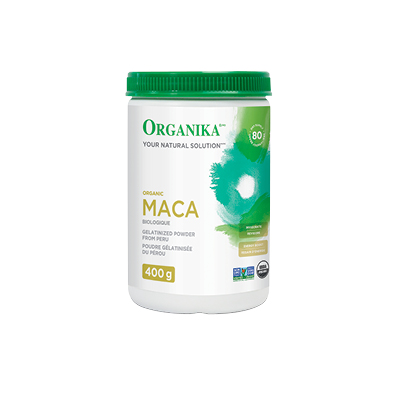Health & Fitness
Are Adaptogens the Secret to a Glowing Complexion and Healthy Skin?
One word to keep in mind? Vigilance.
by : ELISABETH MASSICOLLI- May 19th, 2021

You may have heard the recent buzzword “adaptogens” being mentioned in beauty circles more frequently lately, and there’s a good reason for that. These herbal substances are touted as holistic aids for physical and mental health— both of which are currently top of mind. Adaptogens are, in fact, nothing new. They are herbs, roots or fungi—like ginseng, maca and aloe vera—that have been used for thousands of years in Chinese and Indian medicine and are said to increase the body’s ability to adapt to different stressors. This theory gained popularity during the Second World War, when Nicolaï Lazarev, a Russian toxicologist, studied plants in search of a natural way to efficiently increase the Russian army’s endurance and energy.
Since then, the concept has become way more accessible, and an array of adaptogens—in the form of pills, capsules and powders meant to help or prevent certain medical conditions—is now available in the naturopathy section at the drugstore. Online, it’s easy to find an arsenal of similar products promising miraculous results, often from obscure sources—and therein lies the problem, says nutritionist Amélie Loiselle. “Few studies have demonstrated the real effects of these products, which leads me to think that what we’re being sold isn’t based on solid hypotheses,” she says. “Natural health products are not regulated as strictly as medications. Analyses have shown that certain products don’t contain the exact amount of ingredients indicated on labels or that what they promise has been exaggerated compared to the actual results.” One word to keep in mind? Vigilance.
Proceed With Caution
“Are they dangerous? No,” says Natasha Geddes, a holistic nutritionist and the founder of Good Goddess, a Toronto-based wellness and nutrition company. “Should they be taken seriously? Yes. Although adaptogens are natural, they are considered medicinal and should be treated as such. You should always consult an expert before venturing into this complex world.” Loiselle is also wary. “Studies have been conducted on certain vitamins and antioxidants and [how they affect] skin aging,” she says. “But there have been very few, and we still struggle to agree on recommended dosages, possible risks and potentially harmful effects. As a scientist, I can’t confirm that something is danger-free when I have no proof of that.”
Since hitting drugstore shelves, adaptogens have been making their way into our beauty routines. In 2017, the adaptogen industry was worth US$8 billion in the United States alone. Endorsed by the likes of Gwyneth Paltrow, these plant ingredients have been incorporated into creams, serums and oils as well as powders, teas and other orally consumed products with the promise of delivering picture-perfect skin and an extraordinary glow. Surprisingly, these supplements can now be purchased at Sephora and other beauty-industry giants.
A Holistic Approach
Léa Bégin, a makeup artist and the founder of Beauties Lab in Montreal, has been selling adaptogens in her boutique since she first opened it. “For me, adaptogens are a part of a holistic approach to health and a general wellness mindset,” she says. “I don’t sell them as beauty treatments per se, and I always tell my customers that to provide our skin with the care it deserves, we need to keep in mind that it’s 33 percent lifestyle, 33 percent the products we use and 33 percent nutrition. Everything is connected. There’s no magic formula or truly miraculous product.” According to Bégin, adaptogens like matcha, ashwagandha and reishi work first and foremost on stress and anxiety and on the body’s ability to adapt to its environment—hence the name “adaptogen.” The promised benefits include calming, stimulating and immunizing effects. “The suppliers that are considered trustworthy all send a very clear message: These products are not made to diagnose, treat or prevent illnesses,” she explains. “They are a part of a comprehensive approach to wellness—like yoga, for example. The concept quickly piqued my curiosity, but I continue to approach it carefully and thoughtfully.”
So, can these plants work behind the scenes to boost our overall appearance? By calming our nerves, they may contribute to our overall health and balance and, as a result, give us smoother skin and a healthier complexion. But that’s not all, says Rhiannon Lytle, a holistic nutritionist at Organika, a Canadian company offering natural beauty solutions. She notes that adaptogens are high in antioxidants—known to be anti-aging agents—and that some mushrooms have a hydrating effect similar to that of hyaluronic acid. “A variety of studies have demonstrated the benefits—from stress reduction to glycemic balance—of adding mushrooms and adaptogen herbs to our diet,” she says. “These substances are finally receiving the attention they deserve in the Western world.”
“When it comes to beauty, the real benefits of these products have yet to be demonstrated. ”
Do They Actually Work?
“There’s definitely a relationship between nutrition and skincare,” says Loiselle. “Some ingredients can have an influence on our epidermis. Just think about allergic reactions—the connection is clear. But the impacts of adaptogens still need to be studied.” When it comes to beauty, the real benefits of these products have yet to be demonstrated. Still, many beauty enthusiasts agree that they have completely transformed their wellness routines—and, in the process, their beauty routines. Is that merely a coincidence?
Maybe. But fans are convinced. “People are more and more stressed and, as such, more open to trying products that may regulate their stress and counter its negative effects,” says Geddes. “They’re looking for ways to feel better, and for a growing number, adaptogens are one of the methods they’ve found to improve their well-being.”
Dr. Geneviève Blackburn, a specialist in aesthetic medicine and the founder of Montreal clinic DGB, is on the same page. “Are adaptogens really metabolized by the skin?” she asks. “To be honest, opinions are mixed. Some of my patients swear by them and nothing else. My own test was rather unsuccessful. But if we make sure we’re not taking any products that are contraindicated for our health, I say: Why not try them? If it’s a way to make ourselves feel better and take care of ourselves, and if we combine the practice with coherent lifestyle choices, we might notice positive results. What we ingest really does have an influence on our health and, as a result, on the health of our skin. So, if you ask me, it’s possible!”
Starting Point
Keep in mind that very few scientific studies corroborate the supposed benefits of adaptogens, but there’s nothing stopping you—after consulting a doctor or nutritionist—from making a foray into the world of natural remedies. So, where to begin and how to avoid getting duped? In Canada, thankfully, there are some regulations. “It’s always a good idea to make sure a natural product number, or NPN, is displayed on the container, which signifies that the product has been examined by Health Canada,” says Geddes. Blackburn recommends consulting specialists to help you select products that suit your metabolism and daily routine. Incidentally, Blackburn is part of the team behind the recently launched PEARLL platform, which brings together a number of multidisciplinary health and wellness specialists and acts as a hub for customers seeking advice to improve their lifestyle or even their appearance through naturopathy. Bégin, on the other hand, works with a holistic health coach and a herbalist who help her select the best products to offer to her clients. “It’s important to do research and surround ourselves with competent people,” says Bégin, who offers her curious customers at Beauties Lab a discovery kit that includes a variety of ingestible adaptogens. “Usually, the companies that are serious about adaptogens will clearly state the origin of their products and provide details regarding their production and consumption. If you have to dig deep to find this information, there’s most likely something fishy about it.”
The bottom line? Do your research, proceed with caution and always, always listen to your body.
Curious about the world of adaptogens? Here are some to get you started.
Newsletter
Join our mailing list for the latest and biggest in fashion trends, beauty, culture and celebrity.
Read Next

Fashion
This Canadian Swimwear Brand Designed Canada’s 2024 Women’s Olympic Beach Volleyball Team Uniforms
And they're *so* good.
by : Allie Turner- Apr 24th, 2024
Fashion
The Most Iconic Looks In Met Gala History, From 1973 To Now
40 years of the night that's all about trailblazing fashion.
by : ELLE Australia- Apr 24th, 2024

Beauty
Tested and Approved: A Skin Saviour That Works While You Sleep
Wake up with your glowiest skin yet—even if you didn’t clock eight hours.
by : ELLE Canada- Apr 11th, 2024







